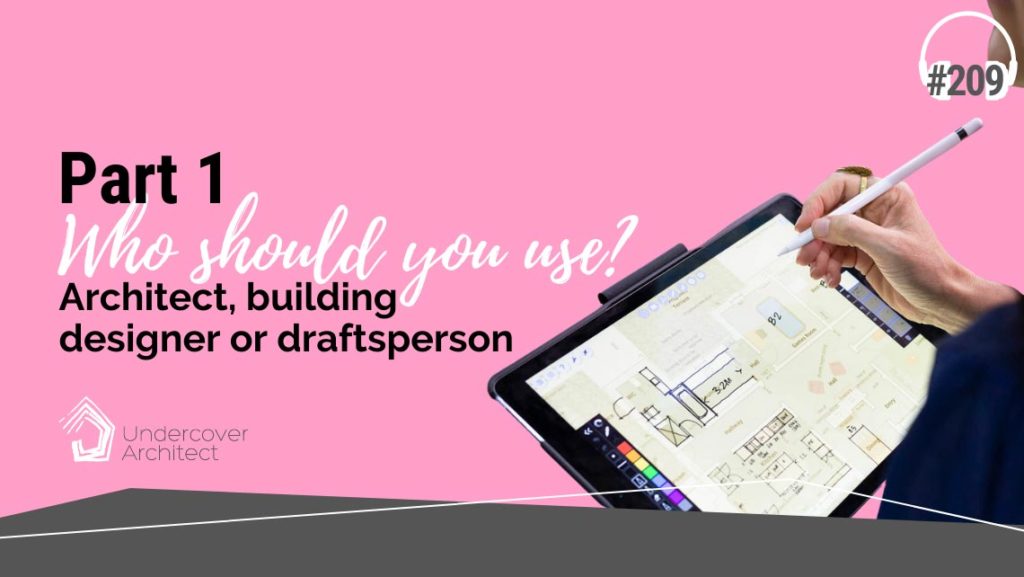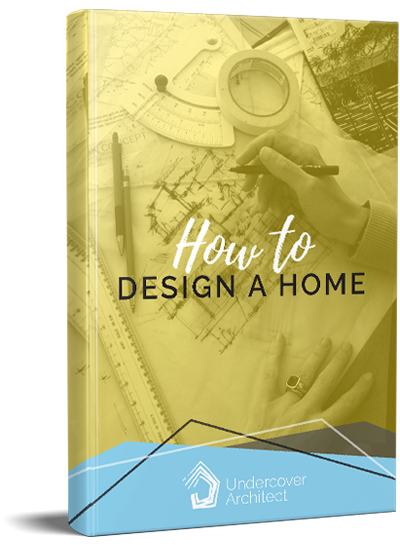
Who should you use? Architect, building designer or draftsperson? [This is Part 1]
Does your budget determine who to use? Or do some project types mean you should use one professional over another?
This is Episode #209, and in it, I’ll be answering a common question I hear from homeowners.
How do you know you don’t just need a draftsperson or building designer, but you should use an architect instead?
And when should you definitely use an architect vs other industry professionals? Or when you can use a draftsperson, or even go straight to a builder?
Or it can be asked in other ways, such as:
“Do architects ever work with small budgets? Can you get an architect to tell you how to use your space better, and then work with others to make the changes? Or do you see a builder or even interior designer first?”
Many homeowners want to know if there’s a way of narrowing down who they should work with based on the kind of project they’re planning. Or if their project will be considered too small or too big for specific type of design professionals.
So, I’m going to be taking you through how to determine who to work with for your project, whatever you’re planning to do.
This is a bit of a chunky topic – in fact, I didn’t realise until I started mapping it out that there can be a lot to weigh up in this decision – so I’ll be doing this across two episodes. This is Part 1 and you can listen to Part 2 here.
The question of who is best to work with on your project design is a really common one. And my approach may be different to others you hear out there, largely because I have the benefit of knowing the huge variety of ways in which design professionals supply their services these days, and the widely varying ways you can work with them as a result.
So, right upfront, I want to say a few things that are my personal beliefs, based on the decades I’ve had in this industry, plus the interactions I’ve had with homeowners over that time as well and the countless designs I’ve reviewed over the years as well. Thousands and thousands of them.
I’m going to do these as bullet points, and then we’ll dive into more detail in the episode so you can gain a more comprehensive understanding of this topic.
And, some of these may sound contentious, or you may not agree with them.
Again, this is based on my personal and professional experience of having worked with A LOT of different industry professionals inside a wide range of relationships and working processes.
And it’s also from hearing and speaking with homeowners that share with me their experience in a wide variety of project delivery methods too.
Here goes:
- Someone’s professional title does not make them a great designer. As with any industry, there are those that are great at what they do, and those that aren’t. So, don’t assume the extent of someone’s skills and abilities based on their job title.
- Draftspeople, as a general rule, are not designers.
- Neither are builders.
- Having an interest in design is not the same as understanding design, being experienced in design and knowing how to create functional, fantastic design outcomes
- Someone who is self-taught in design can be skilled in design, but you want to see a lot of evidence in finished projects that have been tested over time for functionality and performance
- Home design involves making decisions about buildability and durability long-term, it’s not purely a creative endeavour about making spaces and rooms look and feel good
- In home design, you can’t unlink the pragmatic outcome from the aesthetic and creative one. What I mean by this, is that any designer creating a home design needs to understand building codes, logistics on site, and building performance, and balance this with the aesthetic outcome. When they don’t understand this, or have experience in the balance, they expose themselves and the occupants of their home to a lot of risk that can’t always be mitigated by a builder during construction.
- Drawing and designing are not the same thing
And yes, I’m aware that I’m an architect saying these things.
But please understand, I have no attachment to architects being the only people to work with in your new home or renovation project. I remember some of the people I went through uni with who were terrible designers. And I’ve seen some horrible, dysfunctional, architecturally designed floor plans and finished homes in my time.
But I don’t want you to think that your budget means you only get to work with certain professionals in your project.
I’m super passionate about you finding the right designer for you – whoever that is.
And that you are informed and educated about how to look for them, what to ask them, and then how to work with them collaboratively to achieve a great outcome for your project.
AND that you can recognise the red flags before you commit to a dud designer, or know when to walk away inside a not-so-great relationship with one you’re already working with.
And I always get some interesting feedback when I say this out loud, but it comes from over 25 years experience in the industry: draftspeople are not designers. Yes, there can be outliers in the industry, but for the most part, draftspeople will draw your plans, they won’t design them.
I’ve had so, so many homeowners come to me disappointed because they worked with a draftsperson who purely drew up what they were asking, or replicated the plan they’d drawn themselves, or tweaked a plan they’d sourced from somewhere else.
The homeowner was expecting some input, some expansion of ideas, or some testing and questioning of what was possible. They were also expecting some advice on what would work, what wouldn’t and if they were missing anything.
However, time and time again, it’s not been the result when working with a draftsperson.
And the same thing usually happens when homeowners have a builder create their design.
Many think that getting help from a builder who can also do the design work will enable you to kill two birds with one stone. You’ll get a design that’s streamlined for building, and be able to manage your budget throughout the design process too.
However, hopefully from the recent episodes about the PAC Process that I spoke about in episodes #201, #202, #203, #204 and #205, and the episode I did on Design-Construct Projects in #197, you can see the potential issues with using a builder to do the design of your home, and also see there’s other ways to manage cost and buildability without physically getting the builder to design your project as well.
Because there is a big difference between drawing a home and designing a home. And there’s an even bigger difference between designing a home and building a home.
There’s also a lot of risk in the design process. The decisions being made about rooms and spaces, detailing and construction, can come with risk associated with things being fit for purpose, durable, and safe to use.
So, you want to work with a professional who has an understanding of this risk and is appropriately insured as well.
Listen to the episode now.
RESOURCES:
Access my free online workshop “Your Project Plan” >>> FREE WORKSHOP
Take the first best steps in your project, whoever you’re working with, and whatever your dreams, your location or your budget >>> GET STARTED GUIDE
Access the support and guidance you need to be confident and empowered when renovating and building your family home inside my flagship online program >>> HOME METHOD
The top reasons to not use an architect >>> Read the blog here
Not all designers are created equal | Here’s how to choose the right designer for you >>> Listen to Episode #73 here
What should be in an architect’s quote | Top 10 Tips and your design quote checklist >>> Listen to Episode #74 here
Learn how to create a design brief to discuss with potential designers >>> Listen to Episode #196 here
What does an architect do? Shaun Lockyer explains >>> https://undercoverarchitect.com/podcast-episode-1-what-does-an-architect-do-shaun-lockyer/
What does a building designer do? Aaron Wailes explains >>> https://undercoverarchitect.com/podcast-episode-3-what-does-a-building-designer-do-aaron-wailes/
Home Design Masterclass >>> LEARN MORE HERE


 With over 30 years industry experience, Amelia Lee founded Undercover Architect in 2014 as an award-winning online resource to help and teach you how to get it right when designing, building or renovating your home. You are the key to unlocking what’s possible for your home. Undercover Architect is your secret ally
With over 30 years industry experience, Amelia Lee founded Undercover Architect in 2014 as an award-winning online resource to help and teach you how to get it right when designing, building or renovating your home. You are the key to unlocking what’s possible for your home. Undercover Architect is your secret ally
Leave a Reply